
How is VOX making the Spanish flag wave again?
The rise of the far-right party VOX is changing the political climate of Spain. By hegemonizing the ideology of the New Right, the party re-introduces nationalism in the public sphere. This article will explain how VOX is using meta-politics to realize national unity while remaining part of the political debate.
What is VOX?
VOX is the name of the right-wing political party that was founded in Spain by former members of the Populist Party in 2013. According to its members:
"This party was born out of extreme necessity to put institutions at the service of the Spanish population, in contrast to the current model that puts the Spaniards at the service of the Politicians." (VOX, 2019a)
With this description on the first page of its website, VOX already tries to make statements opposing the current government, or even the whole political system in Spain. According to VOX, the nation is declining. The name of one of its position papers, "100 medidas para una España viva" (100 measures to promote Spanish life) clarifies the party's main goal: increasing the wellbeing of the Spanish population in Spain (VOX, 2019c). According to Santiago Abascal, the leader of the party, this can only be realized through cultural and political change, after which representation will be increased for those who do not feel represented and the existing democracy will be improved (RTVE, 2019).
2018 was the year that signified the rise of this new right-wing political movement in Spain because of its success in the regional elections in Andalusia. This also came a year after the Catalan independence movement had initiated a referendum for independence from Spain. Meanwhile, the Spanish government had appointed the referendum as illegal and jailed the leaders of the movement. VOX had already existed since 2013, but the 11% votes the party gained in the regional elections in Andalusia showed its rising popularity (Gálvez, 2018). The country’s political context and Spain’s constitutional crisis offer some insight into VOX’s electoral success, which appears to be related to the Catalan independence crisis.
VOX can be added to the group of Western European radical right-wing parties that share similar political positions in a wide range of topics. However, next to opposing same-sex marriage, abortion, and gender quotas, VOX also promotes a strong position on the national unity of Spain (VOX, 2019c). A study by Turnbull-Dugarte (2019) showed that voters do not vote for VOX out of political distrust, as is the case for some other Western-European right-wing parties. Instead, it seems that most VOX voters were previously supporting other right-wing parties like the Partido Popular and Ciudadanos. The factor that made them shift to VOX was this party's nationalistic distinctive feature concerning its views on the unity of the nation.
VOX’s radical stance especially against Catalan independence and its pro-nationalism appeal to many voters (Turnbull-Dugarte, 2019). Its priority for the re-construction of a newly imagined nation stands out as a characteristic among right-wing parties. According to VOX, this nation must consist of a Spanish population that embodies the Spanish identity and reintegrates historical Spanish values.
VOX's distinctive characteristics
VOX’s distinctive characteristics are bringing a change to the political climate of Spain. VOX distinguishes itself from other political actors by re-introducing nationalism in the country's political debate. Before going into VOX’s discursive way of hegemonizing national unity, we should attempt to get a better understanding of its brand of nationalism. Since this is VOX’s distinctive feature, we should view nationalism as an ideology, as argued by Michael Billig.
When ideologies are powerful, they have a naturalizing effect: they operate to make people forget that their world has been historically constructed (Billig, 1995, p. 37). In the process of remembering history and a nation’s collective memory, this forgetting plays an important role. Over a hundred years ago, Ernest Renan claimed that forgetting was "a crucial element in the creation of nations" (Renan, 1990, p. 11, as cited in Billig, 1995). This takes shape through a constant implicit reminder of national identity in daily life routines. Nevertheless, explains Billig (1995), this reminding is so plentiful that it goes unnoticed for the conscious mind: “The remembering, not being experienced as remembering, is, in effect, forgotten.” Billig calls this state – when the nation and nationalism have become normalized – "banal nationalism". The World of Nations has become a natural world and we can hardly imagine our lives without it anymore. The occasional "un-waved" flag and the playing of the country's anthem during national holidays are examples of these unnoticed reminders of nationalism in Spain.
In contrast, VOX’s eagerness to have a unitary, but administratively decentralized state, one official language, and the preservation of "Spanish values" hints at a more conscious reminding of the Spanish national identity. The following quote from a speech by Santiago Abascal about otherness shows that VOX wants the un-waved flag to be waved again: "It's either our stained, trampled, and spit-at flag or our flag-waving with pride." (VOX España, 2019a)
As evident, when it comes to its strong status as a nation, according to VOX, Spain is not quite there yet. This means that VOX must re-construct Spain into a very specific type of nation, one that can be attributed to the nation-state status of Spain (Billig, 1995) and can therefore re-entextualize already established nationalist tropes. VOX proposes a new form of nationalistic discourse, which distinguishes the party from the mainstream political parties that Spain is used to. According to Giddens, nationalism appears when daily routines are interrupted and a period of social disruption arises (Giddens, 1985, p. 215, as cited in Billig, 1995). An outbreak of "hot" nationalistic feelings appears as and is characterized by a dramatic psychology of emotions rather than of routines.
VOX, with its strong emphasis on national identity, is fostering an outbreak of hot nationalistic aspirations towards Spain and against everything that is not part of this image.
Billig (1995) notes that all nation-states face these moments when ordinary routines are postponed, and attention is given to nationalistic aspirations. With its strong emphasis on national identity, VOX is fostering an outbreak of hot nationalistic aspirations towards Spain and against everything that is not part of this image. VOX fills the existing discourses and symbols of Spanish nationalism – think of bullfighting – with more radical nationalistic ideas while at the same time ensuring that the party is remaining part of the debate. The way they do this is by proposing a new discourse, that of the New Right.
New Right core ideas
The core New Right ideas promoted today are not really new; they are part of a very long tradition. The New Right, Maly (2018b) argues, is the post-war manifestation of the anti-Enlightenment tradition, as advocated by anti-Enlightenment and New Right thinkers. Zeev Sternhell explains that the uprising of anti-Enlightenment thoughts appeared as a reaction to rational, intellectual, and universal thinking during the eighteenth century (Sternhell, 2019). Edmund Burke and Johan Gottfried Herder initiated this tradition contesting the use of reason to understand the world. They claimed that “men’s vital forces” were killed by Enlightenment thinking, philosophy, and scepticism (Sternhell, 2019, p. 143). Anti-Enlightenment thinkers are against universal values and believe more in relationships based on historical, cultural, and ethnic differences than on the equality of all individuals. These differences distinguish nations from each other and encourage xenophobia as a stimulation force for national identity.
Alain de Benoist is a famous New Right thinker known for his contribution to the radical-right group GRECE (Groupement de Recherche et d'Etudes pour la Civilisation Européenne). He defines the right as the conviction that the diversity of the world should be celebrated and the relative inequalities should be accepted as an inevitable, yet positive consequence. Moreover, he adds that the progressive homogenization of the world based on egalitarian ideology should be considered a negative thing. He considers the ideology of equality as the biggest enemy (de Benoist, 2017). VOX takes the hegemonical value of equality and gives it a different meaning, which is a characteristic of the meta-politics often used by New Right parties. Meta-politics is what makes the New Right new.
VOX frames its discourse using the communication technique of meta-politics, ensuring that its views remain acceptable in the public sphere.
Meta-politics was at the heart of the New Right project of Alain de Benoist and GRECE. The perspective of meta-politics has been explained by Alain de Benoist and Charles Champetier in their Manifesto of the French New Right. This perspective is based on the conviction that history is made through human will based on ideas and convictions (de Benoist & Champetier, 2000). According to de Benoist, meta-politics was the strategy needed to bring the "true right" back after the second World War. Of course, in the post-WWII context, it is very hard to articulate an anti-Enlightenment position explicitly. Meta-politics is thus a solution that allows parties to keep the core ideas intact, while at the same time making them acceptable in the public sphere.
Hegemonizing national unity
Generally, VOX uses meta-politics to normalize and hegemonize its idea of a unified nation, consisting of an exemplary Spanish population and with the need to revalue Spanish historical values.
VOX thus positions itself as the hero that can bring back the national unity that was disrupted by federalization or political decentralization. This nationalistic feature is what distinguishes VOX from other parties. Its nationalistic view regarding Spain’s constitutional crisis is, therefore, not coincidentally, the first point in VOX’s political party program "100 medidas para una España viva": "Suspension of Catalan autonomy until the unmitigated defeat of the coup and the purging of civil and criminal responsibilities." (VOX, 2019c)
We have already seen that many VOX voters seem at least partially driven by the party’s stance on Spain’s territory and its regional autonomies, which entails abolishing the structure of a quasi-federal entity and creating a decentralized but still unitary state. According to VOX, "El Estado de Las Autonomías" has failed both economically and in its function of integrating peripheral nationalism (VOX, 2019b). For VOX it even contributed to already existing separatist sentiments. The term "El Estado de Las Autonomías" refers to the agreement made between the parties representing the Catalan and Basque regions and left-wing political parties during the Spanish democratic transition. This agreement tried to combine a unitary state structure with assigned power to administrative and political divisions, the "comunidades autónomas" (Zamorano, 2014), 17 partly self-governing autonomous communities. According to VOX, the responsibility for the decline of the nation lies in this decision to give power to the autonomous communities, resulting in the disintegration of the nation:
"The Autonomous State has not fulfilled the purposes for which it was conceived, and its cost has reached alarming proportions. Political decentralization, which has been pushed to extremes that are dubiously compatible with the Constitution and far from appeasing the nationalist question in Catalonia and the Basque Country, has exacerbated centrifugal tensions and has put Spain on the edge of disintegration. Our autonomous state is politically unmanageable and financially unsustainable." (VOX,2019b)
In VOX’s view, the hegemonic power of Spain has been threatened by political decentralization and separatist movements in the Basque Country and Catalonia. By advocating national unity and therefore the abolishment of the autonomous communities, VOX is convincing voters that this problem can be solved. This view that frames autonomous communities and national unitiy as opposites is seen in an excerpt from a speech by Abascal concerning outgroups: "It is either autonomous division or national unity" (VOX España, 2019). In Abascal's view, federalization is a threat to national unity (VOX, 2019b).
The following quote from another speech given by Abascal in Vistalegre clarifies this idea by emphasizing that the unity of the nation should be prioritized: "Because the Spanish unity cannot be negotiated, nor discussed, nor dialogued, it is defended with all the consequences." (VOX España, 2018b)
Citizens are considered as subordinate to the unified nation, in a stance which is against the notion of individualism and follows the anti-Enlightenment tradition. In this view, the individual is considered part of the organic entity of the nation. This means that the relation of an individual to society is compared with the relation a cell has with the body it is part of. The nation is an entity consisting of its own as well as constructed out of different individual parts, which are all subordinate to it (Maly, 2018). The foundation of all anti-Enlightenment thinking is the organic group and its greatness. The primacy of the group is the only feature that can decide a nation’s role in history. Individualism and an emphasis on universal human rights are traditionally seen as an attack on that nation. The ideas of VOX fall within this line of thinking.
An imagined nation
In the creation of a Spanish unified nation, VOX’s ideals are reminiscent of Gellner’s view on nationalism. According to Gellner (2006), nationalism is a concept of modernity that produces nations. This normalized belief holds that every nation, consisting of people, deserves to have their nation-state. Creating a nation as such is defined by Benedict Anderson (1983) as creating an “imagined political community”. Most of the members of the community will not know the other members of the group, however, they can all imagine the sense of community. The members of the community will thus feel as if they belong together "by the style in which they are imagined" (Anderson, 1983, p. 16).
An important factor that needs to be emphasized is the technique that made this imagination possible. The perception of the other members of the community was made available through what Anderson (1983) calls "Print Capitalism". The sixteenth century meant the birth of the industrial printing press, and the capitalist enterprise of book publishing caused a rising interest in the printing, publication and selling of books. The decline of the Latin language fuelled by the Reformation gave room for the spread and growing popularity of vernaculars. These print-languages, as Anderson (1983) calls them, were the basis for national consciousness. First, a situation arose in which everyone heard about the same news, in a small range of newspapers, in the same language. Second, besides being connected through printed work with fellow members, people could also read the work of their ancestors.
VOX is attempting to create an imagined community.
Print Capitalism thus enabled the imagining of the national community. VOX is actively trying to create national consciousness with the re-construction of the imagined nation but in a very different timeframe and media context. With the use of digital media and social media in particular, through which VOX broadcasts its ideas, the party imagines and tries to (re-)create a specific community, namely a new conservative revolutionary Spanish nation built on traditional values. The strong need for VOX in this recreation of the nation is based on the downfall of the existing nation, caused by the malfunctioning of the current government.
The decline of the nation
As we have seen, according to VOX, the disintegration of the nation has resulted in its decline. In the party's view, the controlling government, under the rule of the Partido Socialista Obrero Español (PSOE, Spanish Socialist Workers' Party) is responsible for this disintegration and therefore the decline of the nation. With the hashtag #GobiernoDelBulo (deceiving government) VOX accuses the government of deceiving the public by telling false stories (VOX {vox_es}, 2020c; see Figure 1). By depicting the PSOE as lying and incapable of solving this crisis, VOX stimulates the dwindling trust in the government.
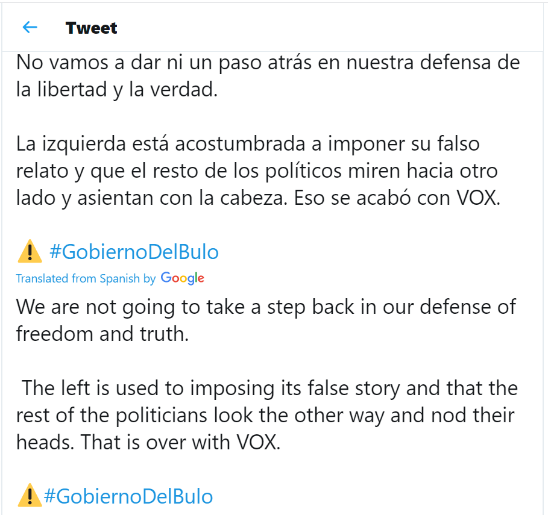
Figure 1. VOX's "deceiving government" tweet.
In different tweets and Instagram posts, VOX is emphasizing the malfunctioning of democracy and the economy during the rule of the PSOE. By doing so, VOX tries to convince its voters of its party’s ability to save the Spanish people and make Spain a strong unified country again. Especially during the Covid-19 pandemic, VOX has focused on denigrating the ruling government through accusations that they have been handling the crisis poorly. In the tweet in Figure 2, we can see how VOX depicts the wrongdoings of the government (VOX {vox_es}, 2020a).
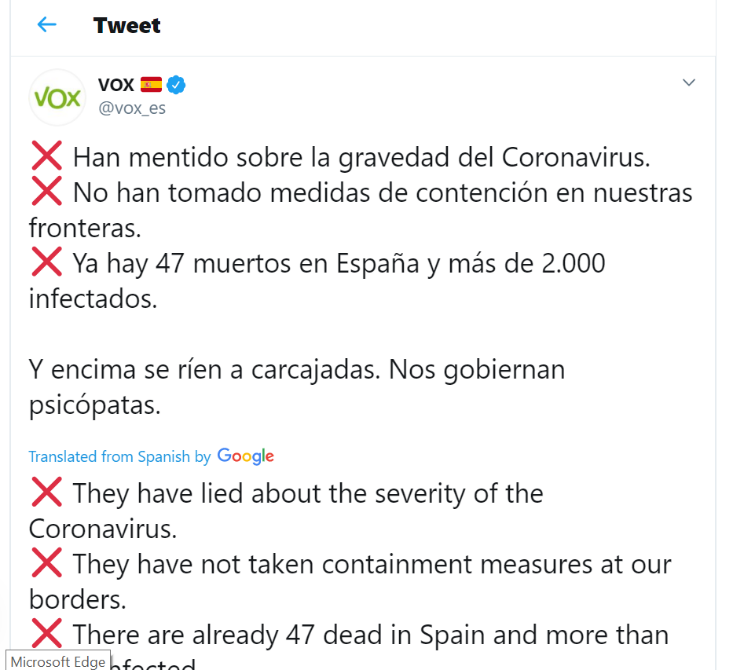
Figure 2. A VOX tweet painting a picture of the Spanish government with regard to its handling of the Covid-19 outbreak.
In the same tweet, as seen in Figure 3 below, VOX blames the high number of Covid-infected people on the government and calls them psychopaths. The tweet continues with a video of Fernando Simon, director of the Centre for Coordination of Health Alerts and Emergencies of the Ministry of Health. Instead of showing the entire video, VOX shows a part in which he is laughing, which points to the lack of seriousness on the government's part (VOX {vox_es}, 2020a).
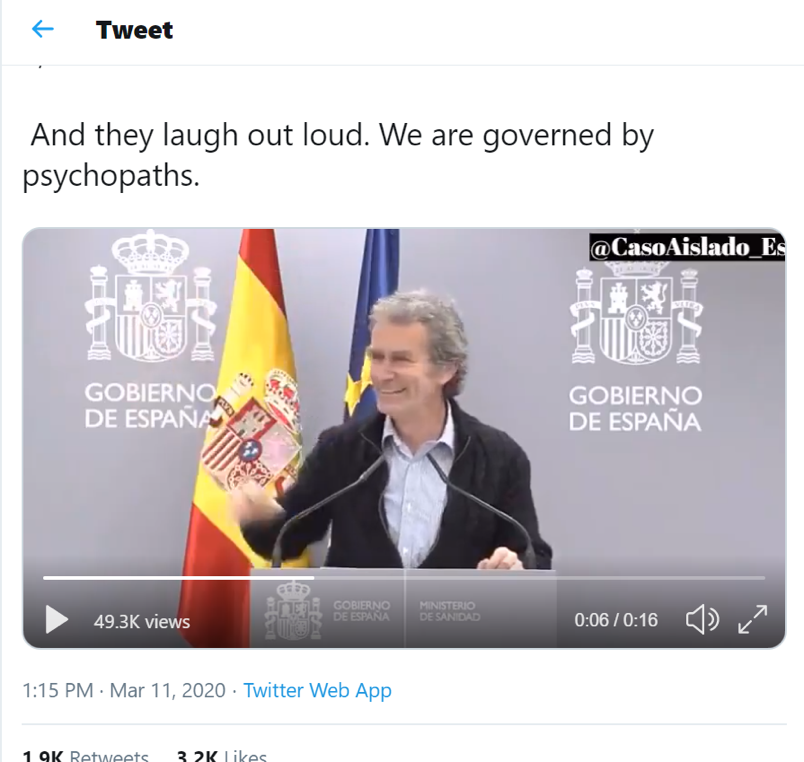
Figure 3. Fernando Simon, director of the Centre for Coordination of Health Alerts and Emergencies, shown smiling in a still from a video in VOX's tweet.
VOX also goes as far as organizing online manifestations calling for the government's resignation: "Join the live show that is prepared to tell you the truth while they lie to you and let’s make the first online demonstration something historic." (VOX {vox_es}, 2020b; see Figure 4) VOX uses the hashtag #GobiernoDimision (government resignation) in arguing against the rule of the current government.
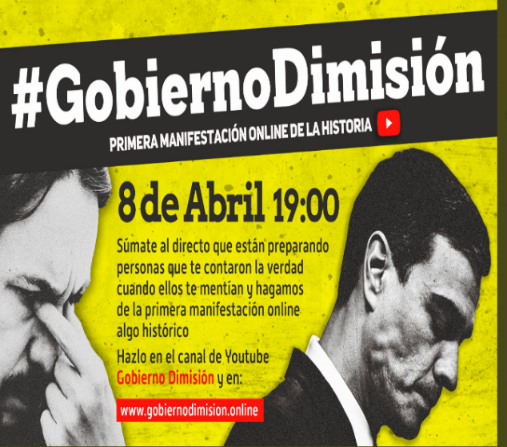
Figure 4. VOX's "government resign" manifestation.
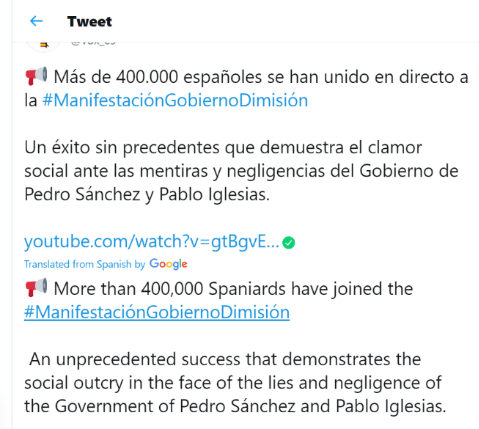
Figure 5. A tweet on the manifestation's supposed success.
Another thing that should be noted about this example is VOX’s emphasis on the 400,000 Spaniards that have joined against the government. VOX defines itself here as belonging to this group and therefore to "the people". The algorithms on social media are based on interaction with the post and even more than a month later, the use of the hashtag #GobiernoDimision still generates many likes (83,853), which is evidence of its long-lasting uptake (VOX {vox_es}, 2020d; see Figure 6).

Figure 6. From VOX's manifestation for the government's resignation.
According to Bonilla and Rosa's work on hashtag ethnography, hashtags allow users to not simply "file" their comments but to performatively frame what these comments are about (Bonilla & Rosa, 2015, p. 5). This allows us to further understand the context of the ethnographic data we find. Even though some time has passed since the introduction of this hashtag, its meaning remains clear. So, every time the hashtag #GobiernoDimision appears, it refers to the same ideal espoused by VOX, in which the party represents the people in a manifestation against the government.
Framing the implicit discourse
By emphasizing who should be blamed for the decline of the nation, VOX promotes the idea that it should be supported as a party through its creation of a unified Spanish nation. The party positions itself against the ruling government and seemingly speaks in name of the people, the constitution, equality, and freedom. According to its members, "VOX is the party of common sense" (VOX,2019a).
The party sounds right-wing but it has polished its discourse. At first glance, the party seems to have appropriated the discourse of Enlightenment and democracy. But as we have seen, its discourse overall has a meta-political character, with which VOX masks its ideology. Its meta-political ideology aims to reach a hegemony of traditionalist, right-wing ideology. These radical ideas are framed by the party's populist claim that it speaks "in the name of the people". Overall, through the implicit hegemonizing of New Right discourse, VOX is silently waving the Spanish flag again.
References
Anderson, B. (1983). Imagined communities: Reflections on the Origin and Spread of Nationalism. Verso.
Billig, M. (1995). Banal Nationalism. Sage.
Bonilla, Y. & Rosa, J. (2015). #Ferguson: Digital protest, hashtag ethnography, and the racial politics of social media in the United States. American Ethnologist, 5. DOI: 10.1111/amet.12112
de Benoist, A (2017). View from the right: A critical anthology of contemporary ideas. Arktos.
de Benoist, A., & Champetier, C. (n.d). MANIFESTO of the French New Right in the year 2000. Retrieved from http://www.4pt.su/en/content/manifesto-french-new-right
Gálvez, J. J. (2018, December 3). Vox: the far-right party that made shock gains in the regional polls. Retrieved from El País: https://english.elpais.com/elpais/2018/12/03/inenglish/1543831474_046256...
Gellner, E. (2006). Nations and Nationalism (2nd edition). Cornell University Press.
Maly, I. (2018a). De hedendaagse antiverlichting. Epo.
Maly, I (2018b). Nieuw Rechts. Epo.
RTVE. (2019, November 10). DISCURSO DE SANTIAGO ABASCAL | Elecciones 10N. Spain.
Sternhell, Z. (2009). The anti-enlightenment tradition. Yale University Press.
Turnbull-Dugarte, S. (2019). Explaining the end of Spanish exceptionalism and electoral support for Vox. Research & Politics, 6, 3-6.
VOX España. (2018b, December 1). Gran discurso de Santiago Abascal en la Plaza de Colón el 1D. {Video File}. Retrieved from: https://www.youtube.com/watch?v=nzYd4Hsh2qw
VOX. (2019a). Que es VOX. Retrieved from: https://www.voxespana.es/espana/que-es-vox
VOX. (2019b). Manifesto Fundacional. Retrieved from: https://www.voxespana.es/espana/manifiesto-fundacional-vox
VOX. (2019c). 100 medidas urgentes de VOX para España. Retrieved from Voxespaña: https://www.voxespana.es/noticias/100-medidas-urgentes-de-vox-para-espan...
VOX España (2019a. October 7). O ellos o nosotros. Retrieved from: https://www.youtube.com/watch?v=L95ilYuqrSU
VOX {vox_es}. (2020a, March 11). Han mentido sobre la gravedad del Coronavirus. No han tomado medidas de contención en nuestras fronteras. Ya hay 47 meurtos en España y más de 2000 infectados. Y encima se ríen a carcajadas. Nos gobiernan psicópatas. {Tweet} Retrieved March 11 from https://twitter.com/vox_es/status/1237713824154816512. Screenshot by author. (Figure 2&3)
VOX {vox_es}. (2020b, April 8) Más de 400.000 españoles se han unido en directo a la #ManifestaciónGobiernoDimisión. Un éxito sin precedentes que demuestra el clamor social ante las mentiras y negligencias del Gobierno de Pedro Sánchez y Pablo Iglesias. {Tweet} Retrieved April 18 from https://twitter.com/vox_es/status/1247958995186397184. Screenshot by author. (Figure 4&5)
VOX {vox_es}. (2020c, April 9) No vamos a dar ni un paso atrás en nuestra defense de la libertad y la verdad. La izquierda está acostumbrada a imponer su falso relato y que el resto de los politcos miren hacia otro lado y asiestan con la cabeza. eso se acabó con VOX. #GobiernoDelBulo {Tweet} Retrieved April 18 from https://twitter.com/vox_es/status/1248160428041142273. Screenshot by author. (Figure 1)
VOX {vox_es}. (2020d, May 24) “Con vuestros coches habéis demostrado que amar a España no es una cuestión de clases. La Patria es de quién la defiende, ya sea desde un Maserati o desde un 600 💪🇪🇸 #EspañaViva #CaravanaFaseLibertad #GobiernoDimisión #Caravana23m #VOX” {Instagram post} Retrieved May 23 from https://www.instagram.com/p/CAkqRT9qH-S/. Screenshot by author. (Figure 6)
Zamorano, M.M., Ulldemolins, J.R. (2014). Spain’s nation branding project Marca España and its cultural policy: the economic and political instrumentalization of a homogeneous and simplified cultural image. Internatinal Journal of Cultural Policy 21(1): 22-30. Retrieved from: https://www.tandfonline.com/doi/pdf/10.1080/10286632.2013.877456?needAcc...